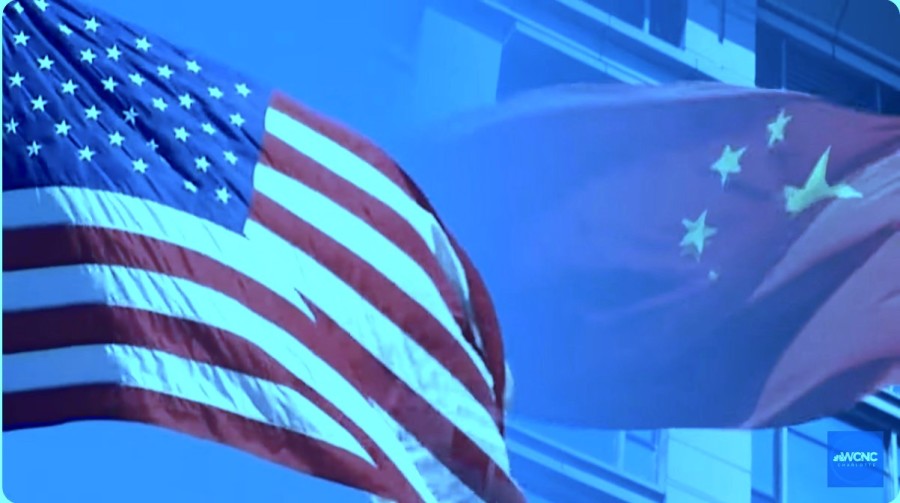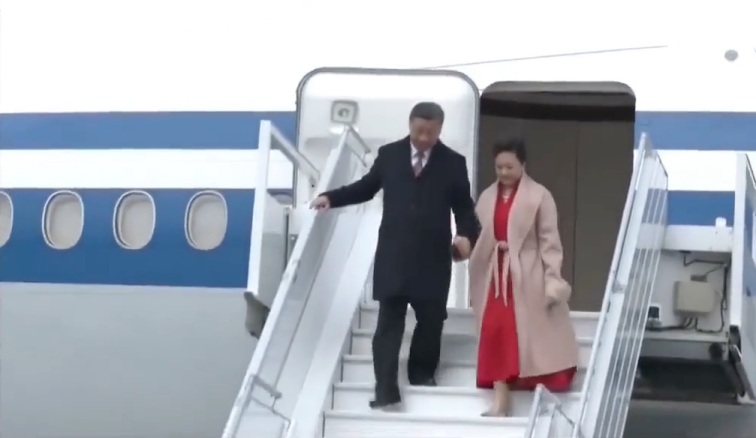U.S.-China Confrontation. (Video screenshot)
[People News] According to Chinese state media, on June 19, Chinese State Councilor and Minister of Public Security Wang Xiaohong met with U.S. Ambassador to China Nicholas Burns in Beijing. Wang stated, "China is willing to work with the U.S. to implement the important consensus reached by the two heads of state, and on the basis of mutual respect, peaceful coexistence, and win-win cooperation, to carry out pragmatic cooperation in law enforcement areas such as drug control and the repatriation of illegal immigrants..."
The peculiarity of this news lies in the fact that Wang Xiaohong, who is not a Chinese diplomat, met with a U.S. diplomat—an unusual break from standard protocol. Moreover, Wang made his intentions clear during the meeting, directly expressing China's willingness to cooperate on drug control and the repatriation of illegal immigrants. However, the state media did not reveal how exactly such cooperation would be carried out or whether details were discussed with Ambassador Burns.
According to past practices, Wang Xiaohong's counterpart on issues like drug control and illegal immigration should be U.S. Secretary of Homeland Security Alejandro Mayorkas. For example, the two met in Vienna in February last year and had a video call in June. Why, then, did Wang shift his dialogue partner this time? Was it because he couldn't reach his usual counterpart, or was this a deliberate effort to lower the diplomatic profile?
Comparing Wang’s current remarks to those in past meetings, it's evident that Beijing has softened its tone. In the February 2023 meeting, Wang's rhetoric was more assertive, emphasizing the need to "respect each other's core interests and major concerns" in order to remove obstacles to law enforcement cooperation, especially on drug control. The underlying message was that if the U.S. failed to respect China's "core interests and major concerns," China would not act to curb the flow of fentanyl into the U.S.
At that time, Wang laid out several demands, including that the U.S. stop harassing and interrogating Chinese students, ensure fair and respectful entry procedures for Chinese citizens, lift visa restrictions on Chinese entities and personnel, and correct the "mistake" of listing China as a major source of drugs. These were framed as China's "major concerns"—demands that the U.S. was unlikely to accommodate.
During their June 2023 video call, although Wang reiterated the need for deeper cooperation on drug control, illegal immigration, and transnational crime, he again urged the U.S. to "seriously address China's concerns and demonstrate sincerity through concrete actions."
Now, a year later, and despite the Trump administration (in place after Biden) not responding to these demands, Beijing has proactively reached out through Wang Xiaohong, who conveyed a willingness to cooperate—with none of the threats or conditions attached in previous exchanges. What accounts for this softening of tone from a regime that has long viewed fentanyl exports as a strategic weapon against the United States?
The author believes this shift is directly related to explosive information recently revealed by former U.S. National Security official Kash Patel.
On June 6, in an episode of The Joe Rogan Experience, Patel claimed that precursor chemicals for fentanyl were being shipped from China to Mexico and Canada to evade U.S. law enforcement. He further accused the Chinese Communist Party (CCP) of deliberately targeting the U.S. with fentanyl as part of a long-term strategy aimed at "destroying generation after generation of young Americans who might otherwise grow up to serve in the U.S. military, police, or as teachers." In other words, the CCP is knowingly using fentanyl to kill hundreds of thousands of Americans. This is a grave accusation.
Fentanyl kills tens of thousands of Americans each year. According to CDC data, from May 2022 to April 2023, over 77,000 people died from overdoses involving fentanyl and other synthetic opioids. This is why former President Trump prioritised fentanyl as a national crisis, even imposing a 20% "fentanyl tax" on Chinese imports.
As a high-level U.S. intelligence official, Patel is unlikely to make baseless claims. His statements suggest the U.S. has concrete evidence—including proof that the CCP subsidises companies openly producing illegal synthetic drugs—and that China is indeed the primary source of fentanyl precursor chemicals. Furthermore, there’s a clear and malicious intent: the destruction of the American people.
With such intentions, how could the CCP be anything but a hostile enemy of the United States? A Trump administration that increasingly sees the CCP's malevolence for what it is will hardly continue to appease Beijing.
In early May (10th–11th), Chinese Vice Premier He Lifeng held high-level trade talks in Geneva with U.S. Treasury Secretary Janet Yellen and U.S. Trade Representative Katherine Tai. Fentanyl was again a key topic.
Bloomberg and The Wall Street Journal reported a striking detail from those negotiations. During the meeting, Secretary Yellen reached into a small bowl in front of her, grabbed a handful of sugar, and told the Chinese officials, "This amount is enough to kill everyone in this room." She then took a bit more and said, "This could kill everyone in Geneva," and finally took an even larger amount and said, "This amount would kill everyone in Switzerland."
Reportedly, Yellen's powerful and humanising analogy shocked the Chinese delegation. Shortly after, the joint U.S.-China statement included a pledge from Beijing to crack down on fentanyl precursor exports.
If Yellen's metaphor moved those within the Chinese system who still possess a conscience—and perhaps sparked internal debate—then Kash Patel’s blunt warning may have served as a hardline wake-up call: if the CCP continues its path of destroying the U.S. and tolerating the sale of fentanyl precursors, it will face much harsher retaliatory measures from America.
Additionally, the recent Israeli strike that decimated much of Iran's leadership may have alarmed CCP officials, making them realise just how dire the consequences of provoking the U.S. can be. The vulnerability of the Iranian dictatorship likely served as a sobering reminder.
Whatever the motivation, the CCP ultimately sent Wang Xiaohong to meet with the U.S. ambassador and express an unconditional willingness to cooperate on fentanyl and illegal immigration issues. While the U.S. may receive the message, it will not fully trust it. The real test lies in Beijing’s actions. If the CCP continues its pattern of false promises and deceptive behaviour, the Trump administration is likely to respond with concrete actions rather than words.
After years of being manipulated by Beijing, America should by now understand how to deal with this rogue regime. △










News magazine bootstrap themes!
I like this themes, fast loading and look profesional
Thank you Carlos!
You're welcome!
Please support me with give positive rating!
Yes Sure!